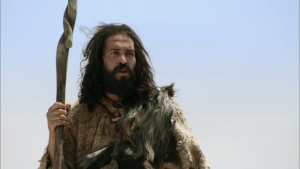HOMILY ADVENT SUNDAY 2 – C
Through Repentance to the Glory of God
(Baruch 5:1-9; Psalm 126; Phil 1:3-6, 8-11; Luke 3:1-6)
*************************************************
St. Irenaeus once said, “The glory of God is man and woman fully alive.”
Repent, believe in Jesus and you too will be fully alive.
In today’s gospel we are told the word of God comes, not to kings or to rulers, but to a prophet in the desert. We also need to go into the desert, into some solitude, to get in touch with who we really are. There, we discover who God is, who we are, and our need to change. The brighter the sunshine, the darker is our shadow. The closer we are to God, the more we see our need to repent, to change.
John’s baptism was a call to a baptism of repentance. Repentance, or metanoia in Greek, means to turn around 180 degrees, a change of life, a change of heart, putting on our higher (meta), best mind (nous).
The metaphors taken from the prophet Isaiah reveal what it is in our lives that needs healing, change and transformation. First of all, there are the mountains of false pride, that tendency in us to hide behind masks, to portray ourselves as better than we are. Next, we are to fill in the valleys of our selfishness, to become more altruistic and generous with the gifts that God has given to us.
Then John invites us to st raighten out the crooked ways of our stubbornness. How often is it that our stubborn self-will gets us into trouble with others? How often do we end up doing our will in God’s name, instead of God’s will? T. S. Eliot, in his play Murder in the Cathedral, put it succinctly: “To do the right deed for the wrong reason is the greatest kind of treason.”
raighten out the crooked ways of our stubbornness. How often is it that our stubborn self-will gets us into trouble with others? How often do we end up doing our will in God’s name, instead of God’s will? T. S. Eliot, in his play Murder in the Cathedral, put it succinctly: “To do the right deed for the wrong reason is the greatest kind of treason.”
Lastly, we are asked to smooth out the rough ways of our anger and resentment. It is so difficult for many people not just to forgive, to let go of their anger and resentment, but to even be in touch with it. So many of us fear and avoid conflict, and so ignore that anger that burns within us. We stay in our heads, instead of connecting our heads with our hearts and our emotions, and making healthier decisions in life. There is much healing that is needed here for many of us.
The other readings motivate us to live out this gospel by pointing out the healthy consequences of believing and repentance. We will experience a harvest of righteousness. A righteous peace will be ours. We will experience to a certain degree, the beauty of the glory that comes from God. And above all, we are told in the gospel that we will see and actually begin to experience the salvation of our God. That salvation is peace, joy, and a right relationship with God, with others, with ourselves and with all of God’s creation that only the Spirit of God can give us.
A veterinarian was called upon to examine a 10-year-old Irish wolfhound named Belker. The dog’s owners and their 6-year-old little boy, Shane, were all very attached to Belker, and they were hoping for a miracle. The vet found that Belker was dying of cancer. He told the family he couldn’t do anything for Belker, and offered to perform the euthanasia procedure for the old dog in their home. As they made arrangements, the owners told him they thought it would be good for six-year-old Shane to observe the procedure. They felt Shane might learn something from the experience. The next day, Shane seemed so calm, petting the old dog for the last time that the vet wondered if he understood what was going on. Within a few minutes, Belker slipped peacefully away. The little boy seemed to accept Belker’s transition without any difficulty or confusion. They all sat together for a while after Belker’s death, wondering aloud about the sad fact that animal lives are shorter than human lives. Shane, who had been listening quietly, piped up, “I know why!” Startled, they all turned to him. What came out of his mouth next stunned them all. They had never heard a more comforting explanation. He said, “People are born so that they can learn how to live a good life — like loving everybody all the time and being nice, right?” The six-year-old continued, “Well, dogs already know how to do that, so they don’t have to stay as long.”
Many of life’s deepest lessons take us a long time to learn. The awareness of our need to change, to repent, to be transformed in some areas of our life, is often elusive and hard to uncover. The Eucharist, our greatest prayer, aids us on our healing journey. It calls us to repentance and transforms us into the Body of Christ, the glory of God
So today, this second Sunday of Advent, we are invited to go deeper, to truly repent, believe in Jesus as Son of God, and be more fully alive.



